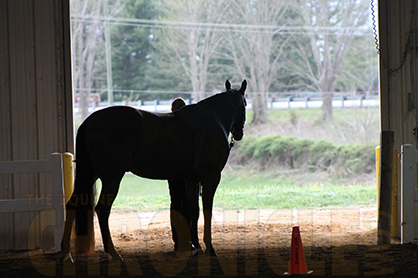Neurological Exams: Evaluate Your Horse Before Someone Gets Hurt
 Dr. Amy Johnson to Demonstrate & Discuss Equine Neurological Exams
Dr. Amy Johnson to Demonstrate & Discuss Equine Neurological Exams
During Free First Tuesday Lecture at Penn Vet’s New Bolton Center
Dr. Amy Johnson, one of the only veterinarians in the country board-certified in both neurology and large animal internal medicine, will conduct a live demonstration of neurological exams on horses as part of New Bolton Center’s First Tuesday Lecture series.
The presentation, “Neurological Exam: Evaluate Your Horse Before Someone Gets Hurt,” will take place on Tuesday, September 6, at 6:30 p.m. at New Bolton Center, 382 West Street Road, Kennett Square, PA. The lecture is free and open to the public.
Dr. Johnson, Assistant Professor of Large Animal Neurology and Large Animal Internal Medicine at New Bolton Center, says it is essential to identify horses with neurologic disease before they hurt their riders, their handlers, or themselves.
Horses are prone to developing neck problems or contracting infectious diseases that affect spinal cord function and can lead to loss of coordination. Initial signs of neurologic disease in horses might be subtle, such as reluctance to perform certain movements under saddle or an occasional trip. Early detection of these signs will increase the chance of successful treatment and, more importantly, reduce the chance of injury.
The presentation will include a live demonstration of a complete equine neurologic examination, on a horse with neurologic disease and on a horse without neurologic disease, to show firsthand how the exam is performed, as well as the mistakes a neurologically impaired horse can make.
The event will begin with a lecture in Alumni Hall, and then move to New Bolton Center’s Equine Evaluation and Performance Facility, an indoor arena, for the examinations. Due to limited seating, reservations are recommended and can be made by contacting Barbara Belt at beltb@vet.upenn.edu.
Fall First Tuesday Lecture Series:
October 4: Dr. Liz Arbittier and Dr. Jessica Morgan, “Sports Medicine: Try Your Hand at Diagnosing Lameness”
November 1: Dr. Kathryn Wulster “3-D Printing in Veterinary Medicine”
December 6: Dr. Kyla Ortved “Regenerative Medicine: Can We Help Our Horses Heal?”
About the First Tuesday Lecture Series
The First Tuesday Lectures, free and open to the public, are presented September through December, and March through June. During the series, faculty and clinicians at New Bolton Center share current information on equine topics of interest to horse owners and caregivers. Many of the lectures highlight the advanced techniques performed by Penn Vet’s team of leading clinicians, and the state-of-the-art equipment and facilities available to ensure the best possible outcomes for patients.
About Penn Vet
The University of Pennsylvania School of Veterinary Medicine (Penn Vet) is a global leader in veterinary education, research, and clinical care. Founded in 1884, Penn Vet is the first veterinary school developed in association with a medical school. The school is a proud member of the One Health initiative, linking human, animal, and environmental health.
Penn Vet serves a diverse population of animals at its two campuses, which include extensive diagnostic and research laboratories. New Bolton Center, Penn Vet’s large-animal hospital on nearly 700 acres in rural Kennett Square, PA, cares for horses and livestock/farm animals. The hospital handles nearly 4,900 patient visits a year, while the Field Service treats more than 38,000 patients at local farms. In addition, New Bolton Center’s campus includes a swine center, working dairy, and poultry unit that provide valuable research for the agriculture industry. Ryan Hospital in Philadelphia provides care for dogs, cats, and other domestic/companion animals, handling nearly 35,000 patient visits a year.
For more information, visit www.vet.upenn.edu.










